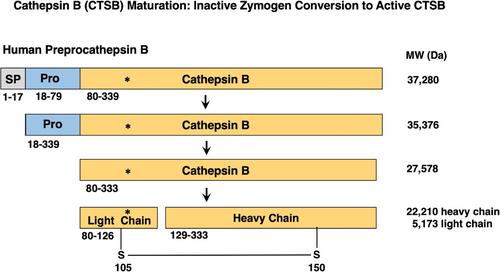当前位置:
X-MOL 学术
›
Pharmacol. Rev.
›
论文详情
Our official English website, www.x-mol.net, welcomes your feedback! (Note: you will need to create a separate account there.)
Cathepsin B Gene Knockout Improves Behavioral Deficits and Reduces Pathology in Models of Neurologic Disorders
Pharmacological Reviews ( IF 21.1 ) Pub Date : 2022-07-01 , DOI: 10.1124/pharmrev.121.000527 Gregory Hook 1 , Thomas Reinheckel 1 , Junjun Ni 1 , Zhou Wu 1 , Mark Kindy 1 , Christoph Peters 1 , Vivian Hook 2
Pharmacological Reviews ( IF 21.1 ) Pub Date : 2022-07-01 , DOI: 10.1124/pharmrev.121.000527 Gregory Hook 1 , Thomas Reinheckel 1 , Junjun Ni 1 , Zhou Wu 1 , Mark Kindy 1 , Christoph Peters 1 , Vivian Hook 2
Affiliation

|
Cathepsin B (CTSB) is a powerful lysosomal protease. This review evaluated CTSB gene knockout (KO) outcomes for amelioration of brain dysfunctions in neurologic diseases and aging animal models. Deletion of the CTSB gene resulted in significant improvements in behavioral deficits, neuropathology, and/or biomarkers in traumatic brain injury, ischemia, inflammatory pain, opiate tolerance, epilepsy, aging, transgenic Alzheimer’s disease (AD), and periodontitis AD models as shown in 12 studies. One study found beneficial effects for double CTSB and cathepsin S KO mice in a multiple sclerosis model. Transgenic AD models using amyloid precursor protein (APP) mimicking common sporadic AD in three studies showed that CTSB KO improved memory, neuropathology, and biomarkers; two studies used APP representing rare familial AD and found no CTSB KO effect, and two studies used highly engineered APP constructs and reported slight increases in a biomarker. In clinical studies, all reports found that CTSB enzyme was upregulated in diverse neurologic disorders, including AD in which elevated CTSB was positively correlated with cognitive dysfunction. In a wide range of neurologic animal models, CTSB was also upregulated and not downregulated. Further, human genetic mutation data provided precedence for CTSB upregulation causing disease. Thus, the consilience of data is that CTSB gene KO results in improved brain dysfunction and reduced pathology through blockade of CTSB enzyme upregulation that causes human neurologic disease phenotypes. The overall findings provide strong support for CTSB as a rational drug target and for CTSB inhibitors as therapeutic candidates for a wide range of neurologic disorders.
中文翻译:

组织蛋白酶 B 基因敲除可改善神经系统疾病模型中的行为缺陷并减少病理学
组织蛋白酶 B (CTSB) 是一种强大的溶酶体蛋白酶。本综述评估了 CTSB基因敲除 (KO) 对改善神经系统疾病和衰老动物模型中脑功能障碍的结果。CTSB基因的缺失导致创伤性脑损伤、缺血、炎性疼痛、阿片类药物耐受性、癫痫、衰老、转基因阿尔茨海默病 (AD) 和牙周炎 AD 模型中的行为缺陷、神经病理学和/或生物标志物显着改善,如12 项研究。一项研究发现在多发性硬化模型中对双CTSB和组织蛋白酶 S KO 小鼠有有益作用。在三项研究中使用淀粉样前体蛋白 (APP) 模拟常见散发性 AD 的转基因 AD 模型表明,CTSBKO 改善记忆、神经病理学和生物标志物;两项研究使用代表罕见家族性 AD 的 APP,未发现CTSB KO 效应,两项研究使用高度工程化的 APP 构建体并报告生物标志物略有增加。在临床研究中,所有报告都发现 CTSB 酶在多种神经系统疾病中上调,包括 AD,其中 CTSB 升高与认知功能障碍呈正相关。在广泛的神经系统动物模型中,CTSB 也被上调而不是下调。此外,人类基因突变数据为 CTSB 上调导致疾病提供了优先权。因此,数据的一致性是CTSB基因 KO 通过阻断导致人类神经系统疾病表型的 CTSB 酶上调来改善脑功能障碍并减少病理学。总体研究结果为 CTSB 作为一种合理的药物靶点和 CTSB 抑制剂作为广泛神经系统疾病的治疗候选者提供了强有力的支持。
更新日期:2022-06-16
中文翻译:

组织蛋白酶 B 基因敲除可改善神经系统疾病模型中的行为缺陷并减少病理学
组织蛋白酶 B (CTSB) 是一种强大的溶酶体蛋白酶。本综述评估了 CTSB基因敲除 (KO) 对改善神经系统疾病和衰老动物模型中脑功能障碍的结果。CTSB基因的缺失导致创伤性脑损伤、缺血、炎性疼痛、阿片类药物耐受性、癫痫、衰老、转基因阿尔茨海默病 (AD) 和牙周炎 AD 模型中的行为缺陷、神经病理学和/或生物标志物显着改善,如12 项研究。一项研究发现在多发性硬化模型中对双CTSB和组织蛋白酶 S KO 小鼠有有益作用。在三项研究中使用淀粉样前体蛋白 (APP) 模拟常见散发性 AD 的转基因 AD 模型表明,CTSBKO 改善记忆、神经病理学和生物标志物;两项研究使用代表罕见家族性 AD 的 APP,未发现CTSB KO 效应,两项研究使用高度工程化的 APP 构建体并报告生物标志物略有增加。在临床研究中,所有报告都发现 CTSB 酶在多种神经系统疾病中上调,包括 AD,其中 CTSB 升高与认知功能障碍呈正相关。在广泛的神经系统动物模型中,CTSB 也被上调而不是下调。此外,人类基因突变数据为 CTSB 上调导致疾病提供了优先权。因此,数据的一致性是CTSB基因 KO 通过阻断导致人类神经系统疾病表型的 CTSB 酶上调来改善脑功能障碍并减少病理学。总体研究结果为 CTSB 作为一种合理的药物靶点和 CTSB 抑制剂作为广泛神经系统疾病的治疗候选者提供了强有力的支持。


























 京公网安备 11010802027423号
京公网安备 11010802027423号